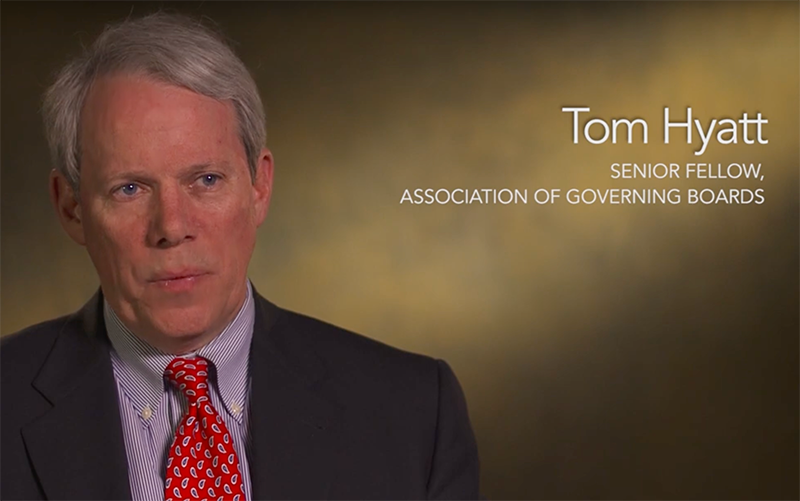The role of the fiduciary.
Tom Hyatt, senior fellow at the Association of Governing Boards, describes the role of the fiduciary in the context of higher education governance in this two and a half minute video.
Click to Read the Video Transcript
Being a fiduciary means that you have a very special relationship.That means that you have a relationship that other’s don’t have with regard to the institution.
Ultimately it simply means that you have a special responsibility for the administration, for the monitoring, for the investment, for the distribution of assets that are entrusted for your care.
In this case it might be the physical assets, the bricks and mortar if you will of the institution, it might be the endowment, the cash capital support of the organization but it also means the faculty, the students, the reputation, all of the things that are truly assets of a college or a university.
Financial responsibility is something that everyone connected with a college or university has in one fashion or another.
Student’s have a financial responsibility to pay their tuition, to pay for room and board, to find a way to either do that themselves or to work with the financial aid department of the school and make sure that that happens.
Officers, the chief financial officer, treasury of an organization for example has financial responsibility to make sure that the budget is balanced or if it’s a deficit budget figuring out where those funds are going to come from.
That’s a reasonability that is a part of what everyone brings to a college or a university. A fiduciary responsibility is different. A fiduciary responsibility is unique to directors and officers of an organization or a college or universities to its trustees or officers.
Here’s an example I think that’s useful as a way to think of what a fiduciary is.
Imagine that you’re a life guard, you’re a very well trained life guard, you’re at the pool but it’s your day off. You’re on the chaise lounge, you’re reading the newspaper, you’re just relaxing, taking it easy, but you notice out of the corner of your eye that there’s a guy going down in the deep end, down for the count in the pool.
Do you have a fiduciary responsibility, a legal responsibility to dive in and help that fellow?
The answer is no, you don’t. Do you have a moral duty? You bet.
But do you have a legal responsibility to go in, dive in and save that person? The answer is no.
Now imagine the same set of facts only this time, you’re up in the chair.
This time you’re the paid life guard for that pool, you have the whistle around your neck you’re up in the chair, you’re looking, and you see this poor fellow going down for the count. Now do you have a responsibility to dive in and save that fellow? You bet.
Now you have a special responsibility that others around the pool, even those that maybe trained life guards don’t have. You have a special reasonability to go in and protect that individual. That’s the essence of a fiduciary responsibility.
Others may have that training but only trustees have that responsibility for a college or a university.
RELATED RESOURCES

Reports and Statements
AGB Board of Directors’ Statement on the Fiduciary Duties of Governing Board Members



